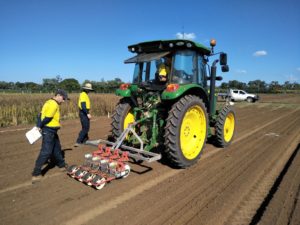“Australia is well positioned to take advantage of new, high-quality shatterproof white and black sesame varieties. By partnering with global companies Equinom and AgriVentis Technologies we hope to advance the time from research to large-scale production. With the right management practices, we can take advantage of high-yielding, non-shattering seed technology to capture market share and develop a profitable and market ready Australian sesame industry,” said Mr McCue.
Savannah Ag Consulting, through Principal Agronomy Consultant, Tony Matchett is supporting the on-ground variety evaluation and agronomic support. Mr Matchett said “Sesame production in Australia has the potential to be a high-value summer cropping alternative for grain growers”.
“There is a big global market for sesame with the top importers being China, Japan and South Korea. These markets are discerning and looking for high-quality whole seed and oil,” said Mr Matchett.
“While it’s only an emerging industry for Australia, two million tonnes of sesame are traded globally each year.”
Mr Matchett said, “The northern regions of Australia are prime candidates for sesame production as it’s a heat and drought tolerant crop. There are also opportunities for sesame in northern New South Wales and southern and central Queensland where it can be grown as a summer crop and tap into existing farming systems and infrastructure.”
Due to ongoing drought conditions the project’s sesame agronomy trials were planted under irrigation in four locations across Queensland and Western Australia between December 2019 and February 2020. These trials are using new white sesame genetics from Equinom (Israel) and black sesame genetics from AgriVentis Technologies (Australia). Savannah Ag Consulting is conducting herbicide screening trials on sesame crops to evaluate the options for weed control.
Funded by AgriFutures Australia’s Emerging Industries Program, the project brings together expertise from partners Equinom, AgriVentis Technologies, Central Queensland University, University of Southern Queensland, Queensland Government and Northern Australia Crop Research Alliance. The project is in its first phase and is expected to continue over three years.












